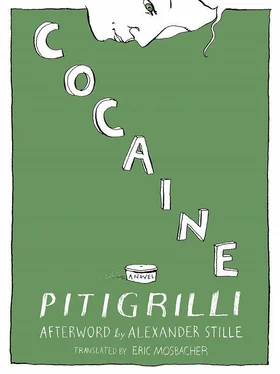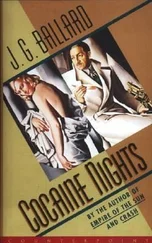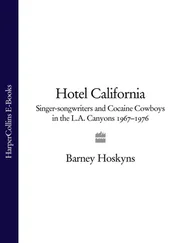“Toulouse.”
“What’s your name?”
“Margot.”
“How long have you been on the game?”
“A year.”
“You’re not infected, are you?”
“What do you think?”
“Then get undressed.”
In the other room on the other side there was another man with another woman, but the conversation was the same.
“What’s your name?”
“Louise.”
“Do you come from Paris?”
“No, Lyons.”
“How long have you…?”
“Eight months.”
“Are you healthy?”
“I’ve never been to bed alone.”
“Take off your chemise.”
The communicating doors between his and the two neighboring rooms were locked, but unknown inquisitive persons had made holes in them at different levels for persons of all heights, and expert hands had temporarily plugged them with balls of chewed paper.
At first the voices of the couples who came together by chance to have their momentary fling, and the subsequent sound of running water, had such a morbid effect on Tito that he spent long hours of the night with his eye to the peep-hole.
But the spectacle was always the same.
Even the most vicious and out-of-the-way and exceptional practices were always the same. Every male thought he was doing something new and extraordinary, but all he did was to repeat with another woman, or even with the same one, what someone else had done half an hour before, who also believed that he was introducing rare innovations into the animal-like rite.
One evening a young Japanese man appeared with a Japanese prostitute whom Tito had seen before on the boulevards.
The couple exchanged a few introductory remarks while the man took off his jacket. The sound of the Far Eastern language reached Tito’s ears distinctly; it apparently consisted of independent syllables, detached from one another like the clicking of a telegraphic keyboard. The man spoke calmly, with a veiled smile on his enigmatic face.
What will they say to each other? Tito wondered, and he answered himself: He will ask her if she has been working as a geisha for long, and she will answer only a few months, and she’ll say she was born in Yokohama, and that her name is Haru, meaning spring, or Umé, meaning cherry blossom…
Montmartre is the breast that has the good fortune to nourish the brain of France, as Rodolphe Salis, the father of the Paris comic press, said. Or Montmartre is simply la Butte, the hill dominated by the Moulin de la Galette, highlighted by the outer boulevards and secured by the two big buttons of the Place Pigalle and the Place Clichy. Montmartre is the modern Babylon, the electrified Antioch, the little Baghdad, the Paradise of the cosmopolitan noctambulist, the blinding, deafening, stupefying spot to which the dreams of the blasés of the whole world are directed, where even those no longer able to blow their noses come to challenge the world’s most expert suppliers of love. Montmartre is the Sphinx, the Circe, the venal Medusa of the many poisons and innumerable philters that attracts the traveler with a boundless fascination. Plays, novels, newspapers spread the perfume of Montmartre through all the continents, a bookish, literary, theatrical, journalistic perfume to which every artist has contributed. Montmartre radiates afar in every direction the glitter of illustrious bald heads, grand-ducal décolletages, regal jewelry, princely shirtfronts and the sharp teeth of insatiable female predators. From a distance every one of us has imagined a fictitious Montmartre embedded in a framework of the names of a few streets, moulins, tabarins and night-clubs.
But when we get there we suffer a disappointment that we do not always dare confess, pretending sophistication. All the same, at heart we have all said to ourselves: Is that all?
“Is that all?” Tito Arnaudi said to his waiter friend after they had visited the most celebrated and characteristic spots together. “I must admit that to me the Latin Quarter and Montparnasse seem much more interesting. Here people pretend to be enjoying themselves; there they pretend to be thinking great thoughts. Of the two I prefer the phony thinkers, because they’re not so noisy.”
Tito had discovered a source of funds.
“I told you you would,” his waiter friend replied. “I told you that the way to find a job was to wander round Paris.”
“You’re perfectly right,” Tito said. “By wandering round Paris I found a source of funds in New York.”
“Explain the riddle.”
“An uncle of mine in America…”
“You mean to tell me that uncles in America really exist?”
“… is the editor of a big morning newspaper. He has just replied by cable informing me that he will be glad to publish any articles I offer him. Thanks to my uncle’s generosity and the favorable exchange rate, I shall be able to earn a by no means despicable monthly income. My first article will be on cocaine and cocaine addicts.”
The waiter had in fact taken him to Montmartre in search of dens where worshippers of la captivante coco gathered.
“Here?” Tito asked at the entrance to a café.
“Here,” his friend replied, pushing him in.
From the outside the café looked gloomy. From the outside Paris cafés generally look gloomy; there’s too much wood and too little glass on the doors and windows, and the little light that might have been able to get in is partly obstructed by the big enamel lettering giving the names of the drinks and their prices.
They were just about to go in when they met the man with a wooden leg, who stepped back to allow them to pass.
“He lives in my hotel,” Tito said, “and no one knows what his job is.”
“Job?” his friend replied. “He’s in a very lucrative business indeed, it’s all in his wooden leg.”
“He must be a beggar,” said Tito.
“Good heavens, no.”
“That’s the only way of earning money with a wooden leg.”
“Is that what you think? He does much better than that. But there’s no hurry. You’ll soon see what I mean.”
The landlord was behind the counter, serving big glasses of beer to a number of taxi drivers, who smelled of cheap tobacco and wet mackintoshes. Behind him bottles of liquor garlanded with little flags sparkled cheerfully on glass shelves, doubly reflected in the walls of bright mirrors behind them and in front of them.
On the counter a big spherical aquarium housed some melancholy red fish. The refraction and the combination of natural and artificial light made them look as strange as Chinese dragons as they swam around gracefully.
“There are some people,” said Tito, drinking a glass of port at the counter, “who go to bed full of aches and pains after a drop of rain, while fish, who spend their whole lives in water, don’t even know what rheumatism is.”
A metallic, strident laugh that sounded as if someone had struck a tray full of glasses echoed through the room.
“Go back in there, you fool,” the landlord called out.
And the girl with the pale face and glassy eyes who had laughed fell back two or three paces as if her face had been slapped, and withdrew behind the reddish curtains that concealed the entrance to the next room.
“ Pas de pétard ici ,” the man continued in slang. Then, realizing that Tito was a foreigner, he translated for him. “ Pas de bruit,” he said.
Tito took umbrage at this. “Are you referring to me?” he said
“ A la môme,” the man explained. “ A la poule .”
When the taxi drivers left, Tito’s friend whispered something to the man, whose only answer was to raise the red velvet curtains.
“ À votre service ,” he said with a bow.
Читать дальше



